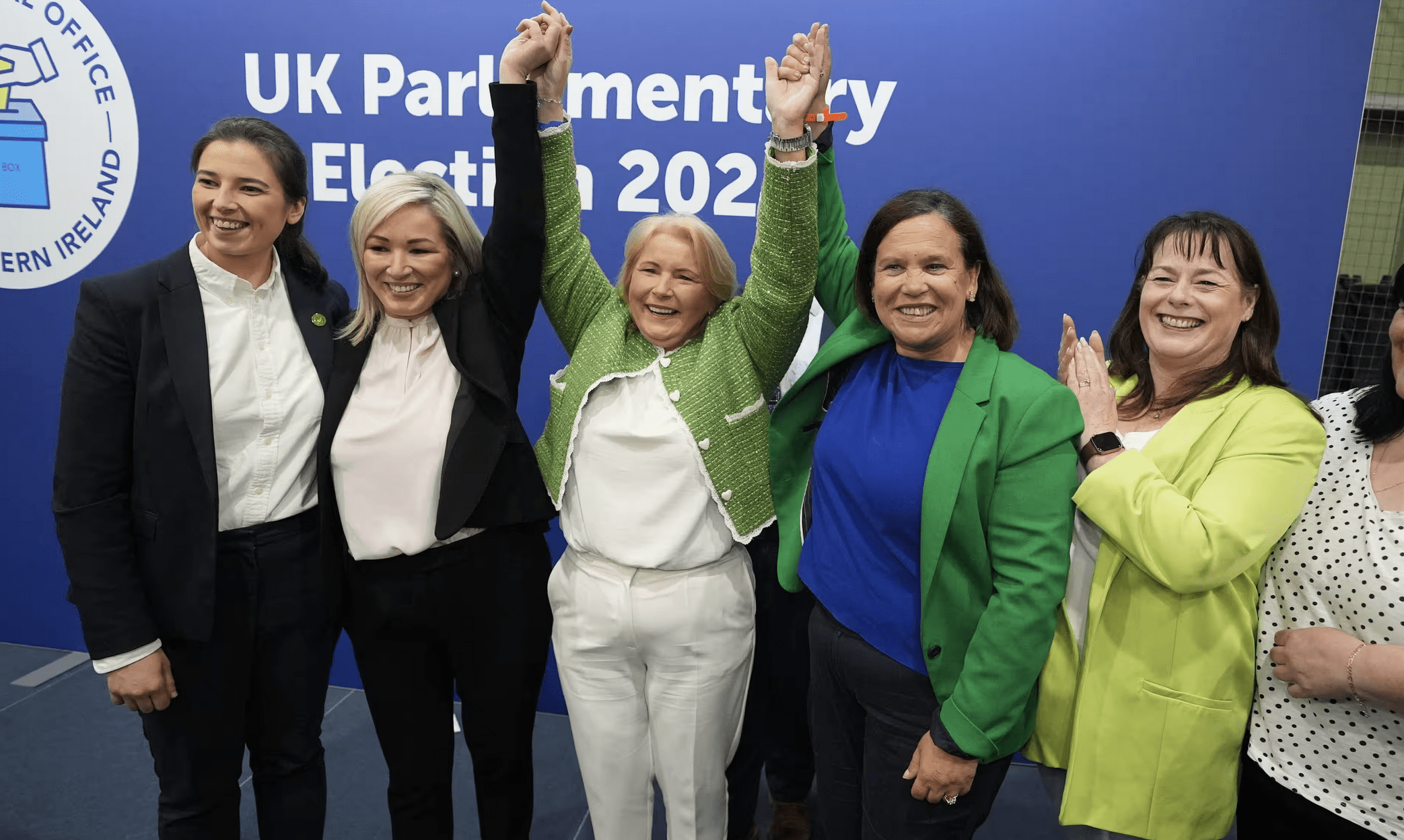Beyond the UK Landslide: A Seismic Sinn Féin, a Welsh Wipeout and a Gutted SNP
 Sinn Féin’s Pat Cullen (C) celebrates with Northern Ireland First Minister Michelle O’Neill (2L) and party president Mary Lou McDonald (3R) after winning the Fermanagh and South Tyrone constituency/PA
Sinn Féin’s Pat Cullen (C) celebrates with Northern Ireland First Minister Michelle O’Neill (2L) and party president Mary Lou McDonald (3R) after winning the Fermanagh and South Tyrone constituency/PA
By Ben Collins
July 5, 2024
The headline story of a Labour landslide under new British Prime Minister Sir Keir Starmer ending fourteen years of Conservative government is only one fascinating aspect of this Westminster election. The Conservatives suffered their heaviest defeat since the 1830s and the Liberal Democrats secured the largest number of seats for a Liberal party since 1906. Sir Ed Davey’s stunts caught the imagination of voters, particularly tactical ones who were keen to vote out the Conservatives. Nigel Farage, standing as leader of the Reform Party, finally made it into Westminster as an MP at the eighth attempt, along with a couple of party colleagues. The fracturing of the right may not be over.
In Scotland, Labour have swept back into power by winning the majority of the Westminster seats, reducing the once-formidable Scottish National Party, to nine seats from 37 at press time. While they are still the party of Scottish Government, these results will put any ambition for a second Scottish independence referendum on the backburner. Starmer, with his more-than 400 MPs, will be able to face down any requests for such a vote. The Conservatives barely survived in Scotland and their Scottish leader failed in his attempt to get elected to Westminster. The Liberal Democrats have also seen an increase in their small number of Scottish seats.
In Wales, Labour maintained its strong position as the largest party represented at Westminster. The Conservatives are now wiped-out in Wales in terms of Westminster seats and the Lib Dems won a seat for the first time in several elections. The most intriguing result in Welsh terms is Plaid Cymru, the nationalist party that wants independence for Wales, doing better than expected by winning four seats. Their vote share across Wales is also up.
Sinn Féin, the party that emerged from the political mainstreaming of IRA aspirations, has now completed the hat trick of being the largest party in Northern Ireland in local government, in the Northern Ireland Assembly and at Westminster.
Of the main UK parties, only the Conservatives stood for election in any Northern Ireland constituencies and in each of the five seats they lost their deposit. The DUP as the largest Unionist and pro-British party, lost three of their eight seats. They were squeezed by parties from across the political spectrum. The liberal Alliance, and two other Unionist parties, the UUP and TUV, each won a seat from the DUP. Sinn Féin, the largest nationalist party in the region, which wants to see a United Ireland, kept all seven of its seats. In addition, they came within two hundred votes of winning an extra seat from the DUP.
So, Sinn Féin, the party that emerged from the normalizing, political mainstreaming of IRA aspirations has now completed the hat trick of being the largest party in Northern Ireland in local government, in the Northern Ireland Assembly and at Westminster. This despite, or perhaps because of, the party’s policy of abstention from the UK Parliament. This is the first time that any nationalist party has been the largest at three levels of political representation. Given that Northern Ireland was created in 1921 by taking six counties out of Ireland’s 32 to have a permanent British majority, this is seismic.
Labour have promised to deliver greater economic growth across all parts of the UK but they are inheriting a challenging fiscal environment with little flexibility. While their support is wide, it is not deep. British politics may continue to be volatile over the next five years and that is partly why the new Labour government have emphasised that they need to deliver in this first term to be able to secure a second one.
The smooth transfer of power from a Conservative to a Labour Prime Minister was to be welcomed and cannot be taken for granted when we see what is happening in some other countries. However, the real highlight from the election was the use of the hashtag #dogsatpollingstations on social media, which is one political tradition that all voters, regardless of their political affiliation, have continued support.
Ben Collins is a Belfast-based communications consultant and author of the book Irish Unity: Time to Prepare.
